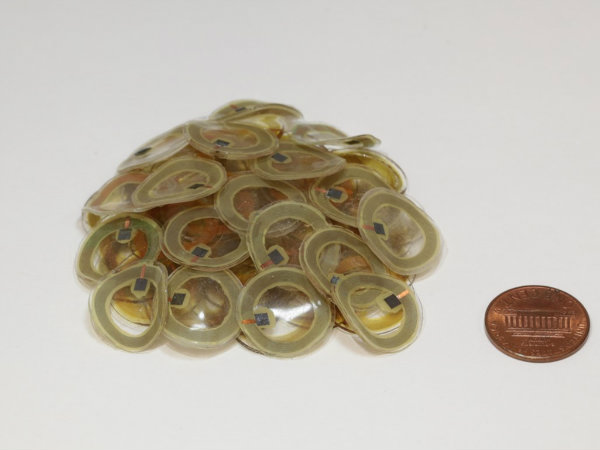Charles Davies, MD, PhD, woke up recently to exciting news from his wife: “The NIH (National Institute of Health) director just tweeted about you!”
“I was amazed and humbled. It’s incredible that someone of his stature is tracking and interested in the research,” Dr. Davies said of the recognition of publication in a top scientific journal.
 Together with John Rogers, PhD, materials science and engineering faculty, Northwestern University, he is developing the first-of-their-kind, non-invasive wireless sensors to determine health status and provide helpful predictive information to prevent disease.
Together with John Rogers, PhD, materials science and engineering faculty, Northwestern University, he is developing the first-of-their-kind, non-invasive wireless sensors to determine health status and provide helpful predictive information to prevent disease.
The penny-sized, battery-free flexible sensors will help hospital staff monitor patients' temperature and body pressure, to prevent bedsores and identify certain sleep disorders, Dr. Davies said.
Dr. Rogers said the sensors resemble a child’s temporary tattoo but are virtually invisible after they attach to skin. Small but mighty, the sensors map variations in temperature and pressure across the body, at different locations simultaneously.
The information collected will trigger nursing staff, helping to prevent skin sores, irritation and pressure ulcers, particularly for those individuals confined to beds. Pressure injuries, sometimes called bedsores, substantially increase costs of care and lengths of stays at the hospital and pose a greater risk for death.
“For patients who are very ill and dependent, it would mean the potential to avoid developing sores. I’m proud Carle is on the leading edge of finding ways to help keep patients safe and to be able to lead innovations that others might find worthy of adopting,” Sanjiv Jain, MD, said.
Rogers and team will now produce the sensors –the first completely battery-free, wireless platform for measuring pressure and temperature at soft tissue interfaces.
Once built, he and Dr. Davies will test the sensors in real-life clinical care environments as part of a clinical research study at Carle. The Carle Institutional Review Board (IRB) approved the study, and Dr. Davies will soon begin recruiting study participants, including stroke survivors and those with diabetes. Treatment for delayed sleep-wake disorders are on the horizon.
“We collect measurements using a multitude of such devices, mounted across different locations of the body simultaneously, and in a way that is compatible with hospital beds and sleep labs,” Dr. Rogers said.
 Historically, these sleep and pressure studies occur in laboratories requiring invasive probes and bulky wired sensors making for an uncomfortable night. The new technology ease discomforts for patients while providing healthcare workers with important information.
Historically, these sleep and pressure studies occur in laboratories requiring invasive probes and bulky wired sensors making for an uncomfortable night. The new technology ease discomforts for patients while providing healthcare workers with important information.
“Our hope is to track sleep patterns much less invasively compared to current, hard-wired technology,” Dr. Rogers said.
Patients’ experience improved and medical staff can benefit, too. Research and innovation are inspiring.
“Personally being able to facilitate projects that can impact patient care, and also emphasizes the role of research and innovation is fulfilling. I can combine providing clinical care with these additional benefits to make our work environment even more stimulating and satisfying,” Dr. Jain said.
Categories: Culture of Quality, Staying Healthy
Tags: Carle, innovation, stroke, research, sleep, sensors, Northwestern
